
The Historic Heart of Aix-en-Provence: Centre Ville
Centre Ville is the beating heart of Aix-en-Provence, a picturesque town located in the Provence-Alpes-Côte d'Azur region of France. Steeped in history, Centre Ville is a charming blend of narrow cobblestone streets, stunning architecture, and vibrant markets, making it a must-visit destination for any traveler. Begin your journey at the iconic Cours Mirabeau, a tree-lined avenue that serves as the main artery of the neighborhood. Here, you'll find an array of cafes, restaurants, and shops, perfect for leisurely strolls or people-watching from a sunny terrace. The area is punctuated by beautiful fountains, each with its unique history and charm. Venture deeper into the labyrinth of lanes and you'll discover hidden gems such as the Saint-Sauveur Cathedral, a stunning example of Romanesque, Gothic, and Baroque architecture. Art lovers will be captivated by the numerous museums and galleries, including the Granet Museum, which houses an impressive collection of works by Cézanne, the town's most famous son. Centre Ville is not just about history and culture; it's also a vibrant hub for food and drink. The local markets are a feast for the senses, offering everything from fresh produce to Provençal specialties. Don't miss the chance to sample local delicacies such as calissons, a traditional almond and melon candy. Whether you're an art enthusiast, a history buff, or simply looking to soak up the Provençal atmosphere, Centre Ville in Aix-en-Provence offers a rich tapestry of experiences that will leave you enchanted.
Local tips in Centre Ville
- Visit early in the morning to experience the local markets at their liveliest and avoid the crowds.
- Wear comfortable shoes; the cobblestone streets can be tricky to navigate.
- Try the local calissons at one of the many specialty shops.
- Take advantage of the numerous outdoor cafes along Cours Mirabeau for a relaxing break.
- Carry a reusable water bottle; there are many public fountains where you can refill.
The Historic Heart of Aix-en-Provence: Centre Ville
Centre Ville is the beating heart of Aix-en-Provence, a picturesque town located in the Provence-Alpes-Côte d'Azur region of France. Steeped in history, Centre Ville is a charming blend of narrow cobblestone streets, stunning architecture, and vibrant markets, making it a must-visit destination for any traveler. Begin your journey at the iconic Cours Mirabeau, a tree-lined avenue that serves as the main artery of the neighborhood. Here, you'll find an array of cafes, restaurants, and shops, perfect for leisurely strolls or people-watching from a sunny terrace. The area is punctuated by beautiful fountains, each with its unique history and charm. Venture deeper into the labyrinth of lanes and you'll discover hidden gems such as the Saint-Sauveur Cathedral, a stunning example of Romanesque, Gothic, and Baroque architecture. Art lovers will be captivated by the numerous museums and galleries, including the Granet Museum, which houses an impressive collection of works by Cézanne, the town's most famous son. Centre Ville is not just about history and culture; it's also a vibrant hub for food and drink. The local markets are a feast for the senses, offering everything from fresh produce to Provençal specialties. Don't miss the chance to sample local delicacies such as calissons, a traditional almond and melon candy. Whether you're an art enthusiast, a history buff, or simply looking to soak up the Provençal atmosphere, Centre Ville in Aix-en-Provence offers a rich tapestry of experiences that will leave you enchanted.
Iconic landmarks you can’t miss
Fontaine de la Rotonde
Aix-en-Provence's iconic 19th-century fountain, adorned with symbolic statues, celebrates the city's rich history, art, and cultural significance.
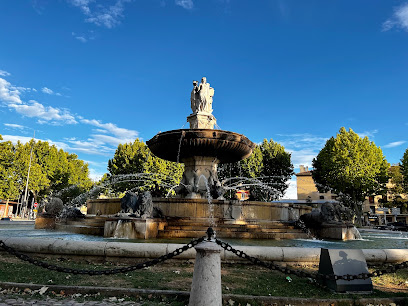
Hôtel de Caumont
Experience art and elegance in an 18th-century mansion, a cultural gem in the heart of Aix-en-Provence. Discover Hôtel de Caumont!
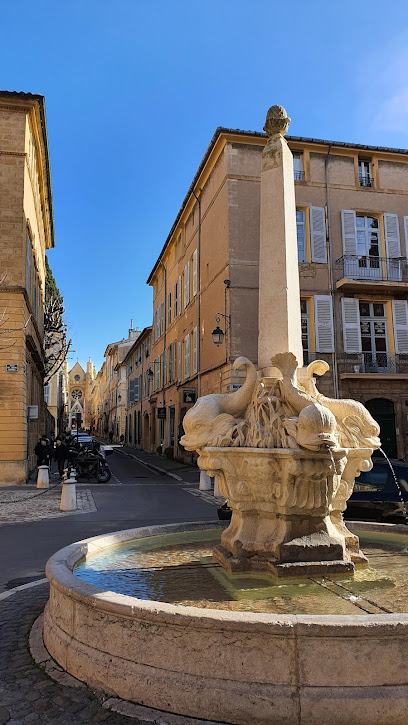
Place des Cardeurs
Experience the vibrant atmosphere of Place des Cardeurs in Aix-en-Provence, a historic square with cafes, restaurants, and cultural events.
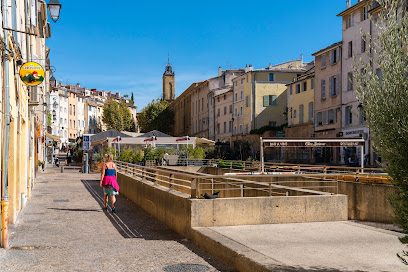
Place des Quatre-Dauphins
Discover the charm of Place des Quatre-Dauphins in Aix-en-Provence, a historic square with a stunning fountain and vibrant atmosphere.
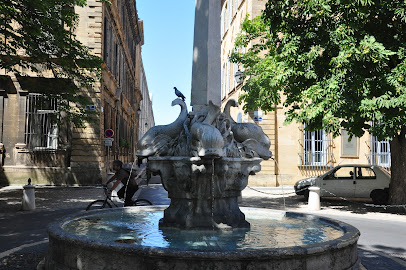
Fontaine Du Roi René
Aix-en-Provence's iconic fountain on Cours Mirabeau, honoring King René and his legacy to Provence. A historical and cultural landmark.
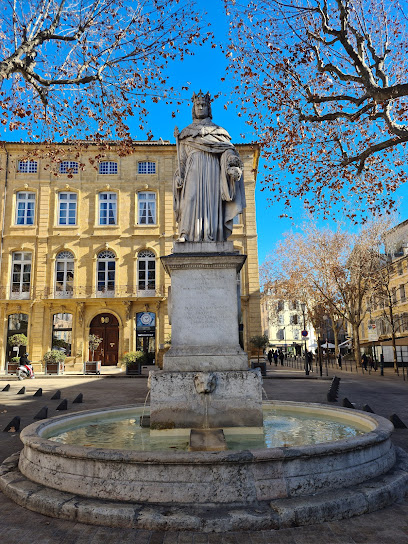
Fontaine des Prêcheurs
Aix-en-Provence's Fontaine des Prêcheurs: A historic fountain showcasing Baroque artistry and a glimpse into the city's rich past.
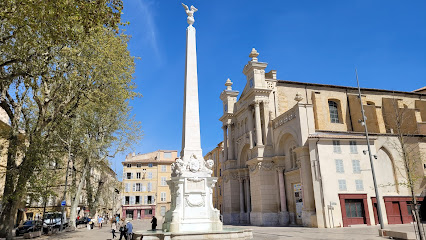
Monument Joseph Sec
Discover a rare example of French Revolutionary architecture in Aix-en-Provence, featuring symbolic statues and a serene garden setting.
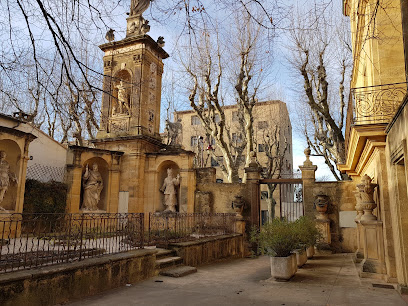
Tour de l'Horloge
Aix-en-Provence's iconic Tour de l'Horloge: a historic clock tower on Place de l'Hôtel-de-Ville, built in 1510 on Roman foundations.
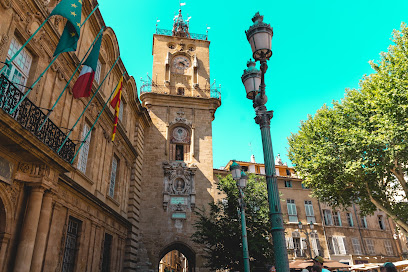
Fontaine Des Augustins
Aix-en-Provence's Fontaine des Augustins: a historic fountain featuring a Roman column in a lively square surrounded by cafes and restaurants.
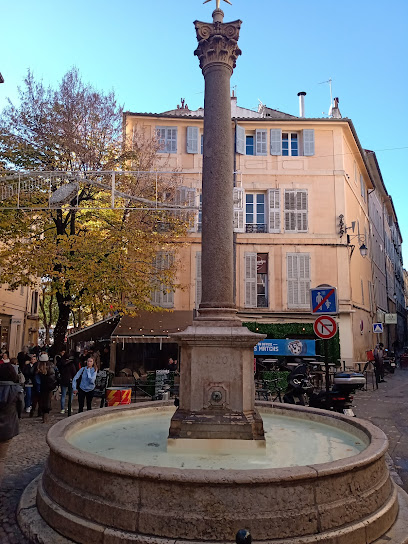
Fontaine des Bagniers
Discover the historical charm of Fontaine des Bagniers in Aix-en-Provence, a serene landmark reflecting the city's rich heritage and artistic ambiance.
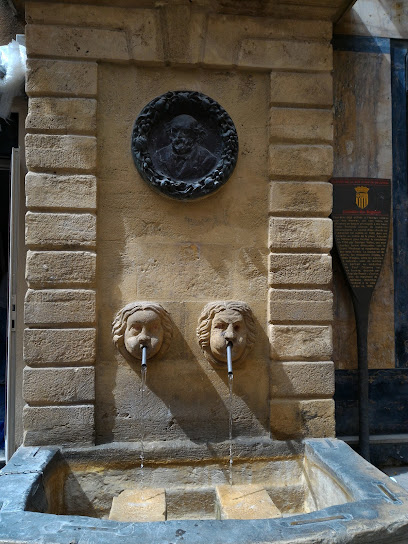
La Quartier du Palais
Discover the historical heart of Aix-en-Provence at La Quartier du Palais, where ancient roots meet neoclassical grandeur and vibrant Provençal life.
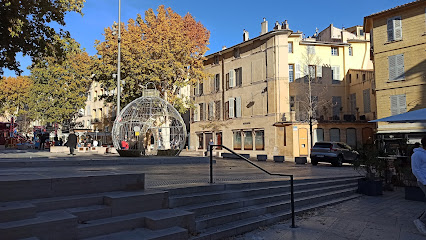
Vieille Ville
Explore Aix-en-Provence's Vieille Ville: a charming maze of history, culture, and Provençal ambiance in the heart of the city.
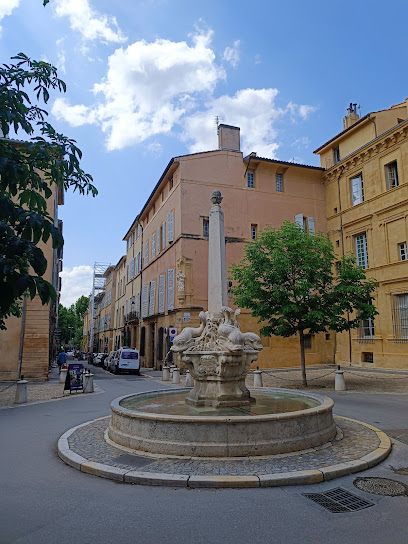
Fontaine de Palais du Justice
Discover the Fontaine de Palais du Justice in Aix-en-Provence: a stunning fountain where history, art, and vibrant city life converge in a picturesque setting.
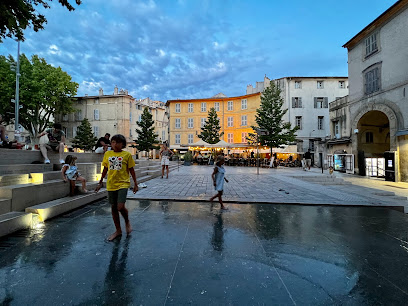
Unmissable attractions to see
Fontaine de la Rotonde
Discover the Fontaine de la Rotonde in Aix-en-Provence, a majestic fountain embodying the city's art, history, and vibrant culture, surrounded by gardens and cafes, a must-see landmark.
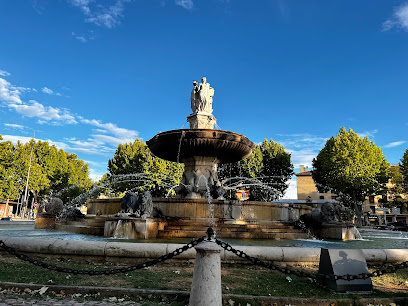
Musée Granet
Discover masterpieces from antiquity to the 20th century at Aix-en-Provence's Musée Granet, home to works by Cézanne, Rembrandt, Picasso, and more, including the Planque Collection.
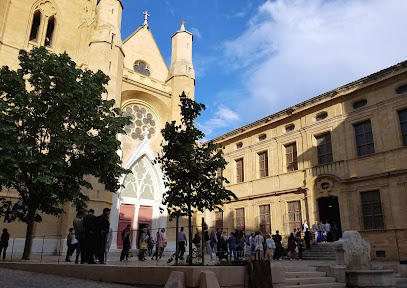
Place des Quatre-Dauphins
Discover the enchanting Place des Quatre-Dauphins in Aix-en-Provence, a baroque masterpiece with a stunning fountain, elegant architecture, and a vibrant cultural atmosphere.
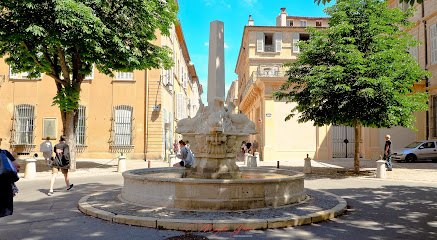
Fontaine Du Roi René
Explore the stunning Fontaine Du Roi René, a historic fountain in Aix-en-Provence, where art, culture, and relaxation meet in a vibrant setting.
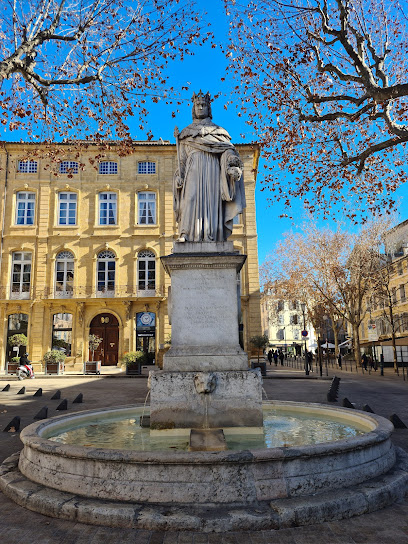
Musée du Vieil-Aix
Discover Aix-en-Provence's captivating history and traditions at the Musée du Vieil-Aix, nestled in a 17th-century mansion showcasing furniture, costumes, and Provençal artistry.
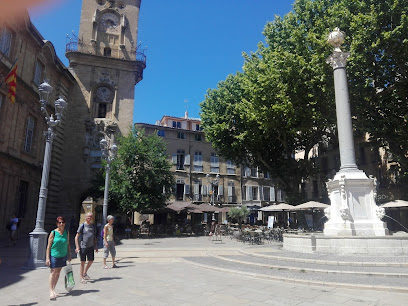
Fontaine Moussue
Discover the enchanting Fontaine Moussue in Aix-en-Provence, a vibrant fountain that embodies the city's rich history and lively atmosphere.
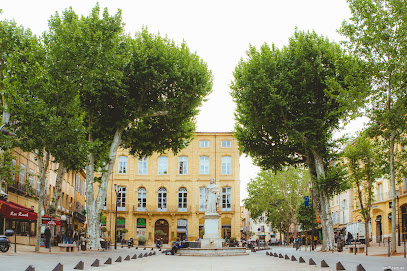
Tourreluque
Explore Tourreluque, a 14th-century tower in Aix-en-Provence, a lasting vestige of the city's medieval ramparts, offering a glimpse into its fortified past and rich historical evolution.
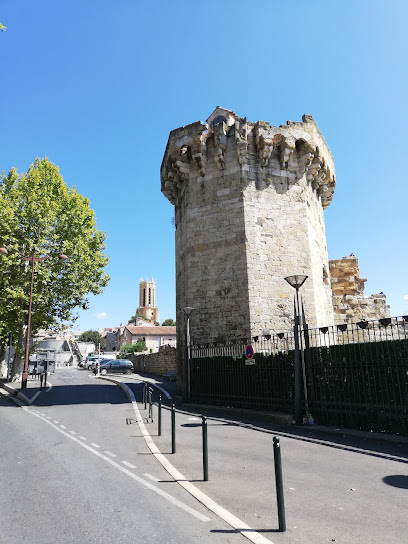
Fontaine Des Augustins
Explore the enchanting Fontaine Des Augustins in Aix-en-Provence, a historical fountain surrounded by vibrant culture and picturesque scenery.
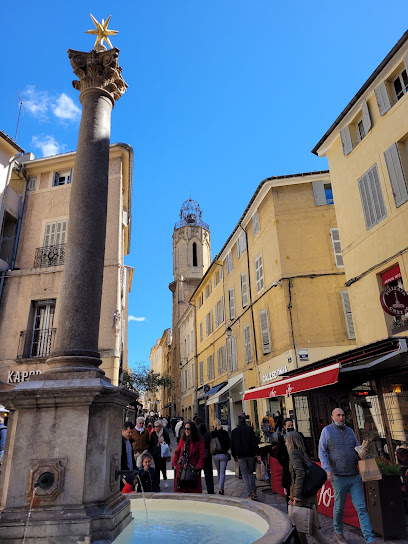
La Quartier du Palais
Discover the historical heart of Aix-en-Provence in La Quartier du Palais, where ancient roots meet neoclassical grandeur and vibrant Provençal life unfolds around every corner.
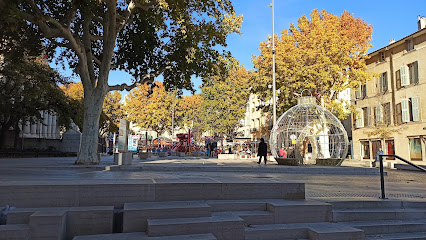
Fontaine de Palais du Justice
Explore the Fontaine de Palais du Justice, a stunning historical fountain in Aix-en-Provence, showcasing exquisite architecture and rich cultural heritage.
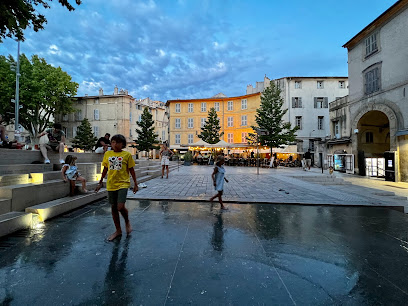
Essential places to dine
Les Fils à Maman Aix en Provence
Discover the heart of French cuisine at Les Fils à Maman in Aix-en-Provence—where traditional flavors meet modern flair in a cozy atmosphere.
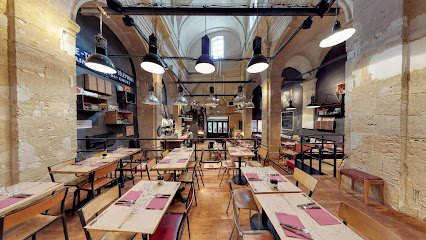
La Mado
Discover exquisite French cuisine at La Mado in Aix-en-Provence, where fresh seafood meets artistic dining experiences.
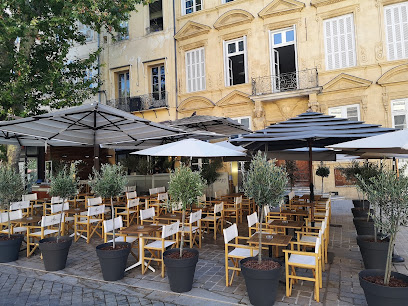
L'incontournable
Experience exquisite French-Mediterranean cuisine at L'incontournable in Aix-en-Provence - where every dish tells a story.
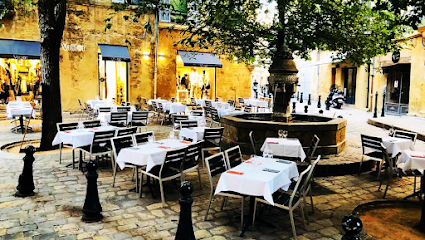
Le bouche à Oreille
Experience authentic French cuisine at Le bouche à Oreille, where local flavors meet culinary excellence in Aix-en-Provence.
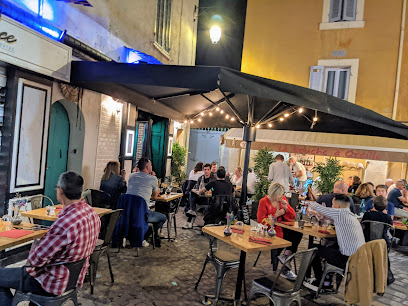
La Bouchée
Experience authentic French and Mediterranean cuisine at La Bouchée in Aix-en-Provence—where every dish tells a story.
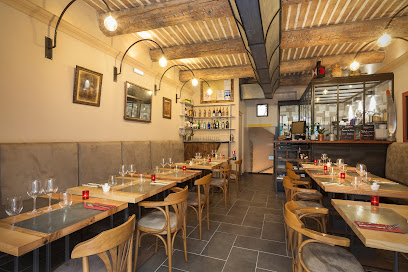
Il Etait une Fois
Discover the elegance of haute French cuisine at Il Etait une Fois in Aix-en-Provence—where every dish tells a story.
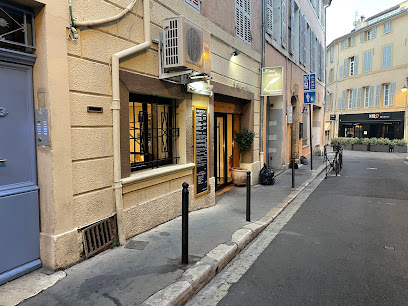
Chez Charlotte - Restaurant Aix en Provence
Experience authentic French cuisine at Chez Charlotte in Aix-en-Provence - perfect for family meals and sweet indulgences.
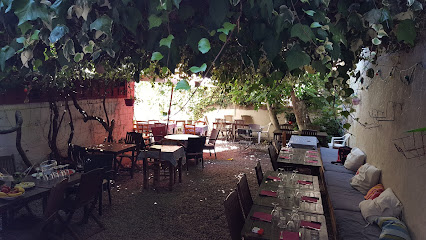
L'Opéra
Discover the culinary artistry of L'Opéra in Aix-en-Provence, where haute French cuisine meets exquisite ambiance for an unforgettable dining experience.
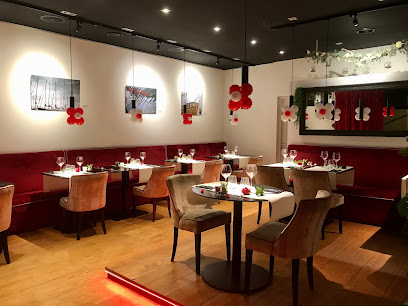
Sauvage
Discover the essence of French gastronomy at Sauvage in Aix-en-Provence – where every dish is a masterpiece.
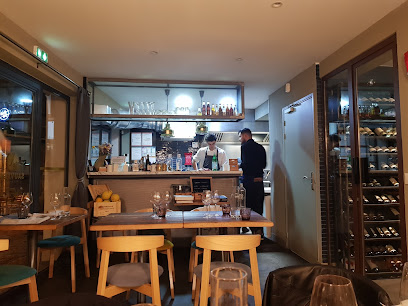
Le Poivre d'Ane
Experience exquisite French and Mediterranean cuisine at Le Poivre d'Ane in Aix-en-Provence's vibrant culinary scene.
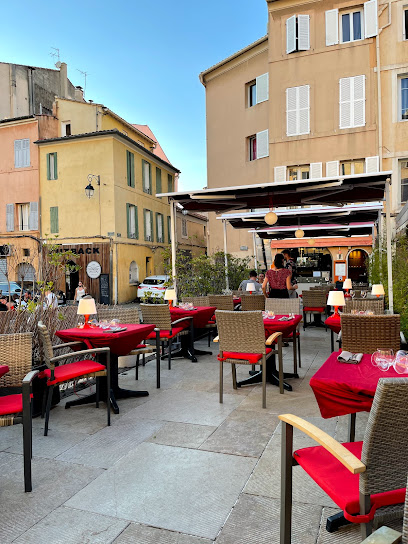
Markets, malls and hidden boutiques
PYLONES
Explore a vibrant gift shop in Aix-en-Provence offering quirky fashion accessories, unique home decor, and delightful souvenirs that capture the charm of France.
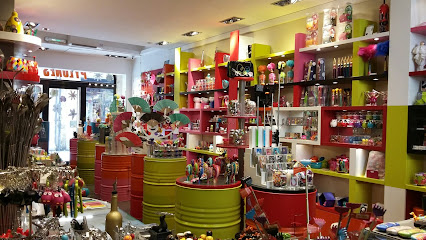
Aix & Co - Maison Onissia
Explore Aix & Co - Maison Onissia, a unique clothing boutique in Aix-en-Provence offering stylish, locally-inspired fashion in a charming setting.
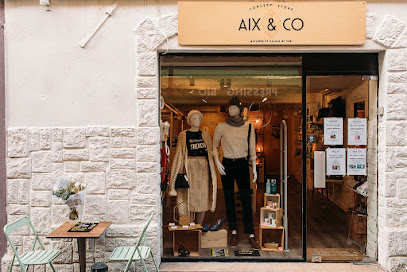
La Grande Boutique - Carlotta
Experience the essence of French fashion at La Grande Boutique in Aix-en-Provence, where style meets elegance in every piece.
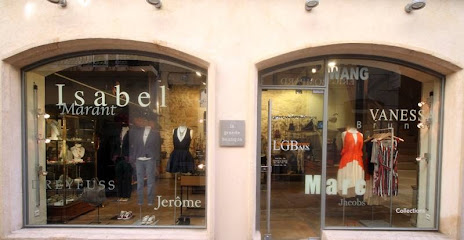
Shop Museums
Explore the charm of Aix-en-Provence at Shop Museums, where unique gifts and local crafts await every traveler.
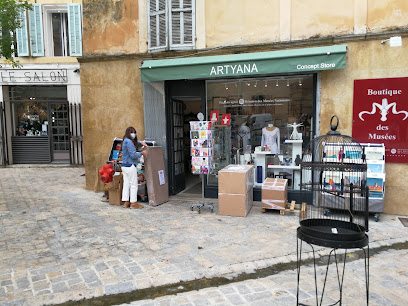
L'oiseau Bleu Concept Store - Dépôt vente
Explore L'oiseau Bleu Concept Store in Aix-en-Provence for unique gifts, antiques, and stylish decor treasures.
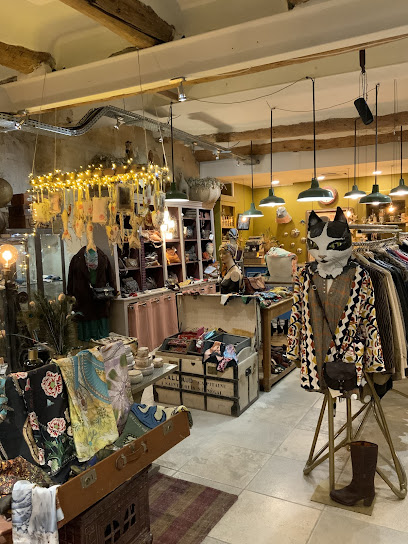
Nouvel Arrondissement
Explore unique gifts and fashion accessories at Nouvel Arrondissement, a charming shop in the heart of Aix-en-Provence.
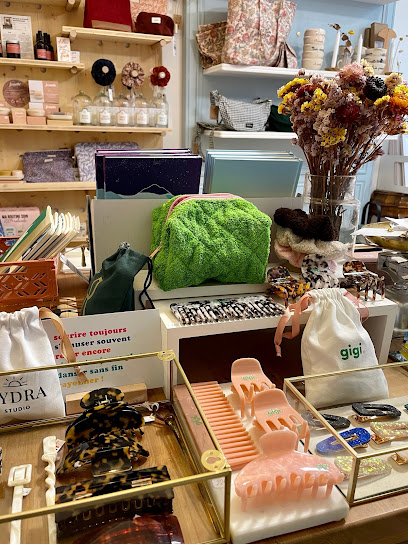
Aix Vintage Store
Explore the charm of Aix Vintage Store, where unique fashion accessories and antique treasures await in the heart of Aix-en-Provence.

La Boutique Wood
Explore La Boutique Wood in Aix-en-Provence for stylish women's clothing and a unique shopping experience amidst charming streets.
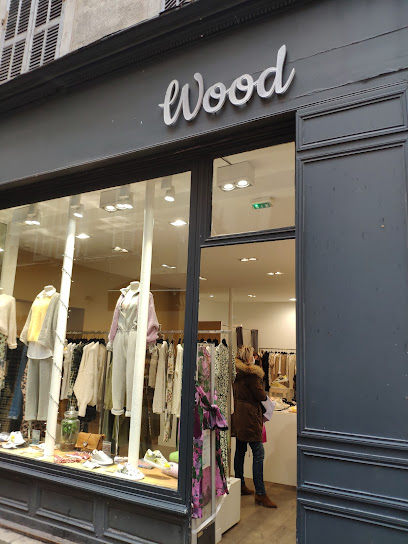
L'éphémère Boutique
Discover unique, locally crafted goods at L'éphémère Boutique in Aix-en-Provence, a charming shopping destination that embodies the spirit of Provence.
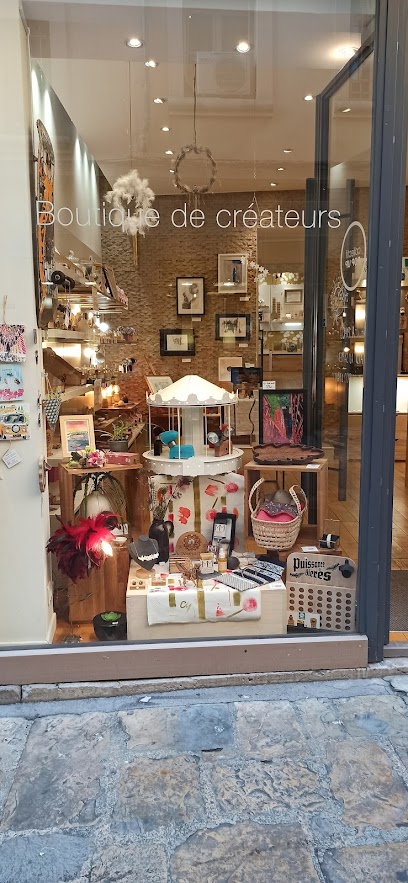
Boutique Acoté
Discover unique fashion at Boutique Acoté in Aix-en-Provence, where style meets local charm in a stunning shopping experience.
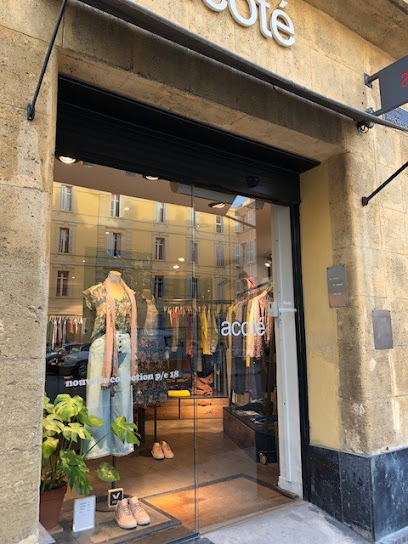
Essential bars & hidden hideouts
Bar Barracuda
Experience the vibrant nightlife of Aix-en-Provence at Bar Barracuda, where unique cocktails and a lively atmosphere await every visitor.
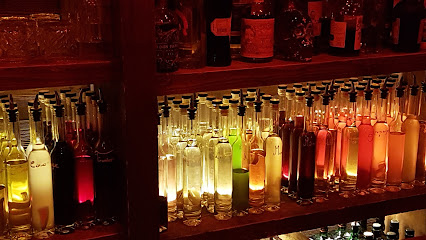
Pub O'Sullivan's
Discover the vibrant nightlife and local charm of Pub O'Sullivan's, a must-visit pub in the heart of Aix-en-Provence offering great drinks and live entertainment.
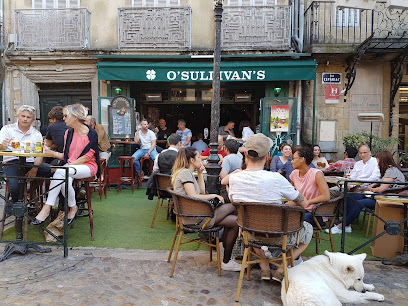
O'Shannon
Discover the vibrant atmosphere of O'Shannon, a cozy pub in Aix-en-Provence, offering a delightful array of drinks and a taste of local culture.
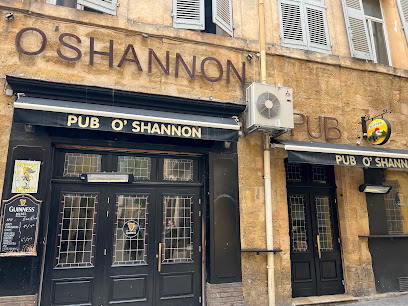
Le Brigand
Discover the lively atmosphere and delightful drinks at Le Brigand, a must-visit pub in Aix-en-Provence's vibrant social scene.
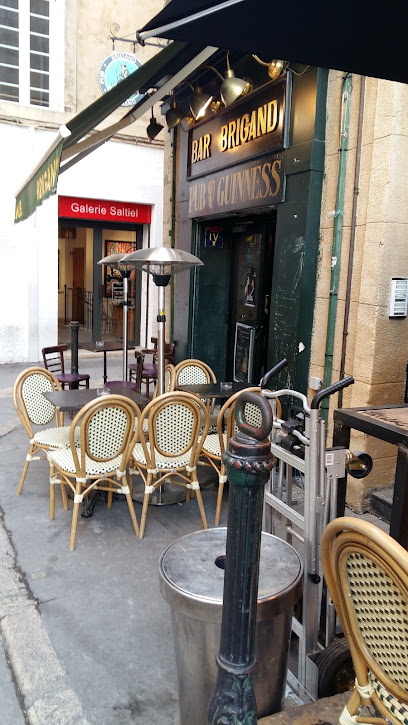
Bar à Bières
Experience the vibrant bar scene in Aix-en-Provence at Bar à Bières, offering a wide selection of craft beers and a lively atmosphere.
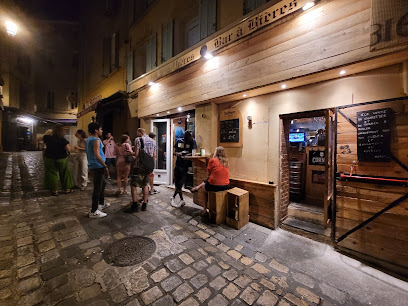
St James pub
Experience the vibrant atmosphere of St James Pub in Aix-en-Provence, where local charm meets a lively bar scene perfect for unwinding after your adventures.
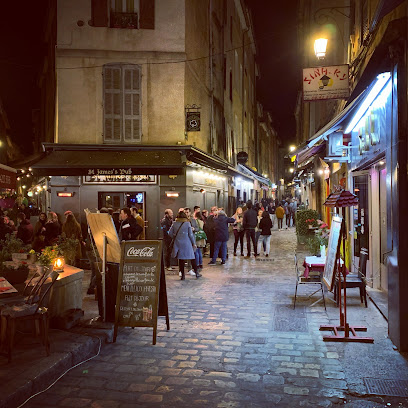
PUB THE KERRY
Discover the lively ambiance and local charm at Pub The Kerry, a must-visit bar in the heart of Aix-en-Provence.
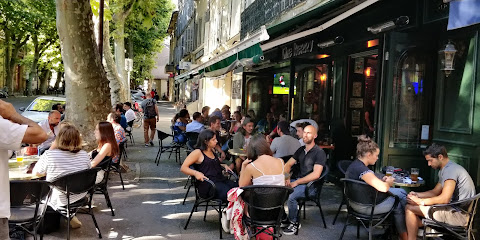
The Cambridge Pub
Experience the charm of Aix-en-Provence at The Cambridge Pub, where culture and camaraderie blend seamlessly over delicious drinks.
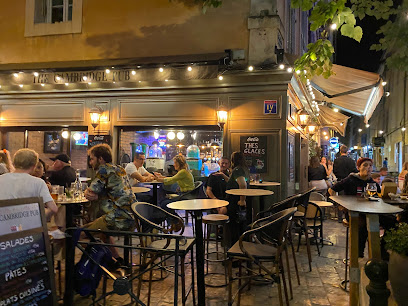
Pub shakespeare
Discover the lively atmosphere and authentic flavors of Pub Shakespeare, an Irish pub in the heart of Aix-en-Provence, perfect for tourists and locals alike.
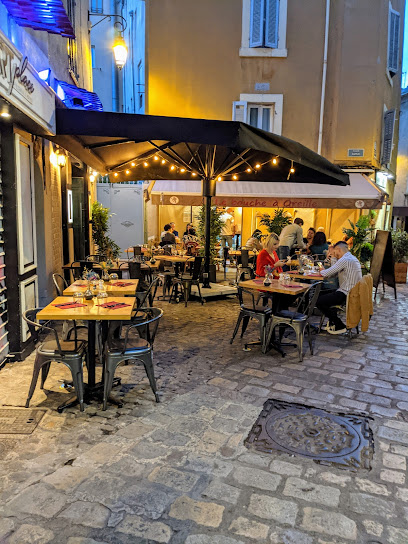
O'barrel
Discover the vibrant atmosphere of O'barrel, a charming pub in Aix-en-Provence, offering local drinks and a lively ambiance for an unforgettable experience.
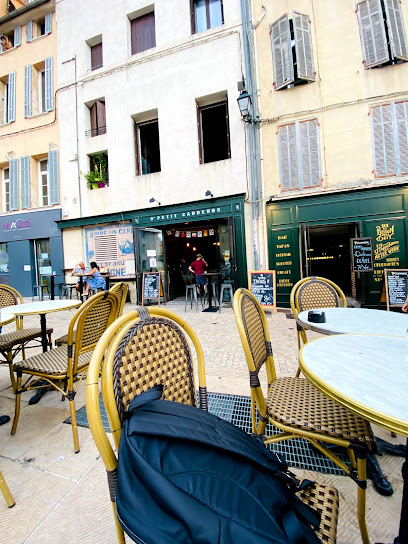
Local Phrases
-
- HelloBonjour
[bohn-zhoor] - GoodbyeAu revoir
[oh-rev-wahr] - YesOui
[wee] - NoNon
[nohn] - Please/You're welcomeS'il vous plaît/De rien
[seel voo pleh/duh ryehn] - Thank youMerci
[mehr-see] - Excuse me/SorryExcusez-moi/Désolé
[ehk-skew-zay mwa/day-zoh-lay] - How are you?Comment ça va?
[koh-mohn sah vah] - Fine. And you?Bien. Et vous?
[byehn. ay voo] - Do you speak English?Parlez-vous anglais?
[par-lay voo ahn-glay] - I don't understandJe ne comprends pas
[zhuh nuh kohm-prahnd pah]
- HelloBonjour
-
- I'd like to see the menu, pleaseJe voudrais voir la carte, s'il vous plaît
[zhuh voo-dray vwahr lah kart, seel voo pleh] - I don't eat meatJe ne mange pas de viande
[zhuh nuh mahnj pah duh vyand] - Cheers!Santé!
[sahn-tay] - I would like to pay, pleaseJe voudrais payer, s'il vous plaît
[zhuh voo-dray pay-ay, seel voo pleh]
- I'd like to see the menu, pleaseJe voudrais voir la carte, s'il vous plaît
-
- Help!Au secours!
[oh suh-koor] - Go away!Allez-vous en!
[ah-lay voo zahn] - Call the Police!Appelez la police!
[ah-puh-lay lah poh-lees] - Call a doctor!Appelez un médecin!
[ah-puh-lay uhn may-day-sahn] - I'm lostJe suis perdu
[zhuh swee pair-doo] - I'm illJe suis malade
[zhuh swee mah-lahd]
- Help!Au secours!
-
- I'd like to buy...Je voudrais acheter...
[zhuh voo-dray zah-shtay...] - I'm just lookingJe regarde juste
[zhuh ruh-gahrd zhuhst] - How much is it?Combien ça coûte?
[kohm-byen sah koot] - That's too expensiveC'est trop cher
[say troh shair] - Can you lower the price?Pouvez-vous baisser le prix?
[poo-vay voo bay-say luh pree]
- I'd like to buy...Je voudrais acheter...
-
- What time is it?Quelle heure est-il?
[kehl ur ay teel] - It's one o'clockIl est une heure
[eel ay oon ur] - Half past (10)Dix heures et demie
[dees ur ay duh-mee] - MorningMatin
[mah-tan] - AfternoonAprès-midi
[ah-pray mee-dee] - EveningSoir
[swahr] - YesterdayHier
[yehr] - TodayAujourd'hui
[oh-zhoor dewee] - TomorrowDemain
[duh-mahn] - 1Un
[uhn] - 2Deux
[duh] - 3Trois
[twa] - 4Quatre
[kah-truh] - 5Cinq
[sank] - 6Six
[sees] - 7Sept
[sept] - 8Huit
[weet] - 9Neuf
[nuhf] - 10Dix
[dees]
- What time is it?Quelle heure est-il?
-
- Where's a/the...?Où est...?
[ooh ay...] - What's the address?Quelle est l'adresse?
[kehl ay lahd-rehs] - Can you show me (on the map)?Pouvez-vous me montrer (sur la carte)?
[poo-vay voo muh mohn-tray (soor lah kart)] - When's the next (bus)?Quand est le prochain (bus)?
[kahn ay luh proh-shahn (boos)] - A ticket (to ....)Un billet (pour ...)
[uhn bee-yay (poor ...)]
- Where's a/the...?Où est...?
History of Centre Ville
-
Aix-en-Provence, originally known as Aquae Sextiae, was founded by the Romans in 123 BC. The city was strategically located near natural hot springs, which attracted settlers. The Roman influence is still evident in Centre Ville, with remnants of the ancient aqueducts and the impressive Roman ruins that lay scattered throughout the area, showcasing the city’s historical significance as a hub of commerce and culture in the Roman Empire.
-
During the Middle Ages, Aix-en-Provence became the capital of the County of Provence. The 15th century saw the construction of the prominent Hôtel de Ville (City Hall) in Centre Ville, symbolizing the political power of the region. The architecture reflects the Renaissance style, and the building has served as the center of local government and civic life, emphasizing the city's importance during this period.
-
In the 17th century, Centre Ville became a cultural epicenter, hosting artists, writers, and philosophers. The establishment of institutions such as the Académie de peinture et de sculpture in 1665 helped cultivate a vibrant artistic community. This period also saw the construction of beautiful Baroque churches, including the Saint-Jean-de-Malte, which showcases the artistic endeavors of the time.
-
The 18th century marked a significant intellectual movement within Aix-en-Provence, with figures like Émile Zola and Paul Cézanne emerging from the region. The salons of Centre Ville became venues for Enlightenment thinkers, fostering discussions on art, philosophy, and politics. The influence of these discussions can be seen in the rich cultural legacy that continues to define the city.
-
The French Revolution in the late 18th century brought significant changes to Aix-en-Provence. The city experienced political upheaval, and many of its noble families were displaced. However, the Revolution also allowed for increased public participation in civic matters. The Place de la Rotonde, a key location in Centre Ville, became a focal point for gatherings and celebrations, embodying the revolutionary spirit of the time.
-
The 19th century saw significant urban development in Aix-en-Provence, driven by industrial growth and the arrival of the railway. Centre Ville expanded with new boulevards and public squares, transforming the urban landscape. The establishment of the Palais des Congrès and other cultural venues helped solidify Aix as a center for tourism and culture, attracting visitors to its historic charm.
Centre Ville Essentials
-
Centre Ville is easily accessible from other neighborhoods in Aix-en-Provence. If you're coming from the train station, you can reach Centre Ville by walking; it is approximately a 15-minute stroll. Alternatively, local buses run frequently, connecting the station to the city center. For those driving, the main roads lead directly to Centre Ville, but be mindful of parking regulations and availability.
-
Centre Ville is best explored on foot due to its narrow streets and pedestrian-friendly layout. Public transport options include buses that connect to nearby neighborhoods and attractions. Bicycles can be rented from various local shops, and Aix-en-Provence offers bike lanes for safe cycling. Taxis are also available for convenience, but walking will allow you to soak in the charming atmosphere of the area.
-
Centre Ville is generally safe for tourists; however, as in any city, it is advisable to stay alert. Petty crimes, such as pickpocketing, can occur in crowded areas like the markets and popular squares. While there are no specific high-crime areas, it’s best to avoid poorly lit streets at night and to keep your belongings secure.
-
In case of an emergency, dial 112 for immediate assistance. The local police station is located in the city center, and there are several hospitals and clinics available for medical emergencies. It’s recommended to have travel insurance that covers health-related incidents. Pharmacies are widely available for minor health concerns and over-the-counter medications.
-
Fashion: Do dress comfortably, but consider modesty when visiting religious sites. Don't wear overly casual clothing in upscale restaurants. Religion: Do respect local customs; when entering churches, cover your shoulders and knees. Public Transport: Do give up your seat for the elderly and pregnant women. Don't engage in loud conversations. Greetings: Do greet locals with a friendly 'bonjour' and a smile. Eating & Drinking: Do try local cuisine and enjoy meals at outdoor cafés. Don't rush your meals; dining is a leisurely affair.
-
To experience Centre Ville like a local, visit the daily markets for fresh produce and local delicacies. Engage with vendors, as they often share recipes or cooking tips. Explore lesser-known cafes and bistros away from tourist hotspots to enjoy authentic Aix-en-Provence cuisine. Don’t miss the chance to join local events or festivals, which can provide a deeper understanding of the region’s culture.
Trending Landmarks in Centre Ville
Nearby Cities to Centre Ville
-
Things To Do in Marseille
-
Things To Do in Avignon
-
Things To Do in Nîmes
-
Things To Do in Saint-Tropez
-
Things To Do in Cannes
-
Things To Do in Montpellier
-
Things To Do in Nice
-
Things To Do in Fontvieille
-
Things To Do in Les Moneghetti
-
Things To Do in Moneghetti
-
Things To Do in La Condamine
-
Things To Do in Monaco-Ville
-
Things To Do in Monte Carlo
-
Things To Do in Larvotto
-
Things To Do in Saint Roman













